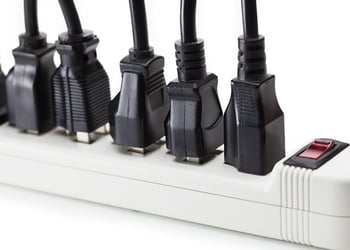 Whether you own the building your business operates from —or lease space to another business—you may not be thinking about it, but you’re responsible for providing efficient and safe electrical service for the occupants. What happens if you or your tenants overload the electrical system? And how does that even happen?
Whether you own the building your business operates from —or lease space to another business—you may not be thinking about it, but you’re responsible for providing efficient and safe electrical service for the occupants. What happens if you or your tenants overload the electrical system? And how does that even happen?
Essentially, you can overload your system when you run more amperage across an electrical circuit or outlet than it can handle. Here’s an example: say an electrical outlet in your commercial building is designed to safely carry 50 amps of current and it is protected by a 50-amp circuit breaker. If you connect an electrical appliance requiring 60 amps of current to the outlet, the breaker may allow the outlet to deliver 60 amps to the appliance—but the wire and breaker will start to heat up, and that can lead to an electrical fire. The same thing can happen if you connect multiple devices through that same circuit.
Some pieces of equipment require higher amounts of energy, and too often businesses simply aren’t aware of how much energy their devices are pulling. To ensure optimum performance—and safety—you really want to be sure that your system is designed to handle the load you put on it, and equipment that consumes high amounts of energy should be on dedicated outlets.
Your system can be also be overloaded by loose or corroded wires and connections. That can be caused by exposure to moisture or a bad splice—things you might not even be aware of. You can end up constantly tripping the breakers, damaging equipment—or worse.
So how do you avoid the problem? If you’re finishing out space that you’re going to lease, have a reputable electrical contractor review your energy requirements. Talk about what kind of equipment (and how much equipment) you anticipate using. Then you can look at your building’s electrical system and see if it’s designed to handle that load. Will it take a little bit of time? Yes. Will it cost you something? Sure, but less than you might think and it’s nothing compared to the cost (financially and otherwise) of overloading your system. A little bit of time and money up front can really pay off in productivity and safety down the road.



